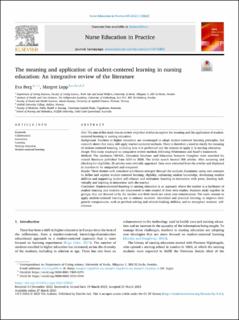| dc.contributor.author | Berg, Eva | |
| dc.contributor.author | Lepp, Margret | |
| dc.date.accessioned | 2023-10-31T11:25:22Z | |
| dc.date.available | 2023-10-31T11:25:22Z | |
| dc.date.created | 2023-04-26T10:33:16Z | |
| dc.date.issued | 2023 | |
| dc.identifier.citation | Nurse Education in Practice. 2023, 69 . | en_US |
| dc.identifier.issn | 1471-5953 | |
| dc.identifier.uri | https://hdl.handle.net/11250/3099705 | |
| dc.description.abstract | Aim The aim of this study was to review empirical articles to explore the meaning and the application of student-centered learning in nursing education. Background Teachers in higher education are encouraged to adopt student-centered learning principles, but research shows that many still apply teacher-centered methods. There is therefore a need to clarify the meaning of student-centered learning, including how it is performed and the reasons to apply it in nursing education. Design This study employed an integrative review method, following Whittemore and Knafl’s framework. Methods The databases CINAHL, Education Database and Education Research Complete were searched for related literature published from 2010 to 2020. The initial search located 308 articles. After screening and checking for eligibility, 25 articles were critically appraised. Data were extracted from the articles and displayed in matrices to be categorized and compared. Results Three themes with attendant sub-themes emerged through the analysis: foundation, using core concepts to define and explain student-centered learning, eligibility, enhancing student knowledge, developing student abilities and supporting student self-reliance and realization, learning in interaction with peers, learning individually and learning in interaction with the teacher. Conclusion Student-centered learning in nursing education is an approach where the teacher is a facilitator of student learning and students are empowered to take control of their own studies. Students study together in groups; they are listened to by the teacher and their needs are taken into consideration. The main reasons to apply student-centered learning are to enhance students’ theoretical and practical learning; to improve their generic competencies, such as problem-solving and critical-thinking abilities; and to strengthen students’ self-reliance. | |
| dc.language.iso | eng | en_US |
| dc.relation.uri | https://www.sciencedirect.com/science/article/pii/S1471595323000847?via%3Dihub | |
| dc.rights | Navngivelse 4.0 Internasjonal | * |
| dc.rights.uri | http://creativecommons.org/licenses/by/4.0/deed.no | * |
| dc.title | The meaning and application of student-centered learning in nursing education: An integrative review of the literature | en_US |
| dc.title.alternative | The meaning and application of student-centered learning in nursing education: An integrative review of the literature | en_US |
| dc.type | Peer reviewed | en_US |
| dc.type | Journal article | en_US |
| dc.description.version | publishedVersion | |
| dc.source.pagenumber | 9 | en_US |
| dc.source.volume | 69 | en_US |
| dc.source.journal | Nurse Education in Practice | en_US |
| dc.identifier.doi | 10.1016/j.nepr.2023.103622 | |
| dc.identifier.cristin | 2143430 | |
| cristin.ispublished | true | |
| cristin.fulltext | original | |
| cristin.qualitycode | 1 | |

